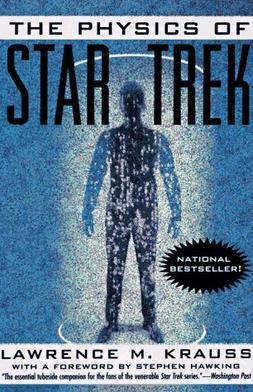The Physics of Star Trek
Reviewed Apr 4, 2018 on The Litt Review.

I am not, by any stretch of the imagination, a physicist. I opted to take Art History and Political Science instead of Calculus and Physics in high school, and the majority of my physics and maths since then have been picked up in pop culture books and through osmosis with smarter people. After reading The Physics of Star Trek, I regret to announce that I am still not a physicist. Luckily, it wasn’t written for MIT-bred PhDs studying gravity waves somewhere in a labcoat; it was written for the kind of person who picks up genre fiction for bargain prices at charity shops. This definition, by any stretch of the imagination, defines me.
This was a fun little book. Unfortunately, there are a few things that worked against it. One: my version was published in 1996. There’s been a few updates to science, since then. For instance, there’s no mention in this book of CERN’s experiments in Geneva, or Higgs Boson particles. So, I had to take a lot of the “my colleagues are studying this today” with a grain of sodium. That having been said, science generally moves at the pace of a slug on sodium anyway, so it wasn’t a major issue. Most of the classical knowledge was the same as it would be today, and it was fun to learn more about relativity more, and some of the more interesting physical phenomena I don’t know about, like solitary waves.
I started this book while in the middle of watching all of Star Trek: The Next Generation, which took me over a year to get through. I’d never watched it before. It was fun picking up the episodes as I went through this book, and seeing the series mentioned. This very much was a book about Star Trek. Knowing the context when Krauss said that La Forge and Ro were shifted out of phase in one episode, and were able to walk through walls but still stand on floors, was satisfying, all the more so because I noticed the same inconsistency when watching the show. For that aspect alone, this book was amusing.
The forward was also written by Stephen Hawking; I went back and read it again after he passed away, and again after I saw the episode where he plays cards on the Enterprise. It was great to learn why Hawking is famous - I haven’t read his books myself - in relation to Star Trek, a show he actually he had a cameo in. I enjoyed that personal, little tribute of mine.
All in all, a good book. I didn’t take a lot of notes - why would I need to know about anyons in the future, and what use is the knowledge to me without a framework to hang it on (that of a foundation of physics and higher maths, which I don’t have) - so there’s not a ton for me to say or go forward with. But sometimes, books are just enjoyable in themselves for reading. This was one of those.
Do you want to get book reviews and notes from books I read in your inbox? Sign up! I'll include a summary, my favorite quotes from the book, and any vocabulary I found interesting or didn't know already.